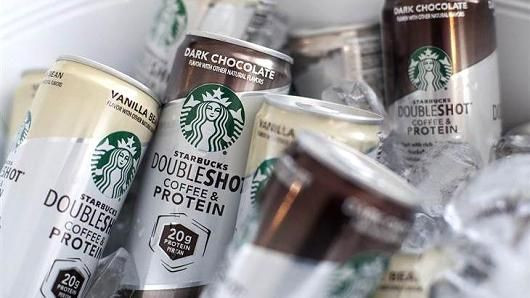Starbucks' Protein-Rich Coffee Meets Consumer Demand, But Fails To Keep Sugar Levels Down

Protein is quickly becoming one of the most popular nutrients on the modern American menu. The vital macronutrient has transitioned from a simple dietary building block into a buzzword and fad, making it a prime target for food industry marketing strategies. In 2013, 57 percent of consumers increased their protein purchases, according to a recent Food Technology report. Starbucks’ new Doubleshot Coffee & Protein drink is the newest addition to the long line of protein products recently introduced to American consumers. It adds to a list of protein-packed granola bars, shakes, cereals, soups, and even potato chips.
Protein is one of the three basic macronutrients essential for health, growth, and immune function according to the National Institutes of Health. The other two macronutrients are fats and carbohydrates. We need protein to sustain a healthy stamina throughout the day, and Starbucks promises 20 grams (g) of protein with each 8-ounce (oz) serving of its coffee drink.
But, if you try the new drinks, you’ll be getting a lot more than just the protein.
Doubleshot Coffee & Protein contains about the 21g of sugar, 200 calories, and 2.5g of total fat in its vanilla flavor blend. The can is actually 11 oz, but the nutrition label only measures out for 8 oz. The extra 3 oz bring your sugar consumption to nearly 29g of sugar, breaking the recommended daily sugar intake per person. This month, the World Health Organization announced adults and children should limit their sugar calories to 10 percent of their total daily intake. The organization noted, however, that five percent is the ideal amount. That means for the average person, it is best to only consume 25g of sugar, or roughly 6 teaspoons a day.
"None of these sugars are going to do anything for your body," Brooke Alpert, registered dietitian and founder of counseling service B Nutritious, told the NY Daily News. “It’s a total miss. Protein at breakfast is a great way to start the day, but this isn't the answer.”
Protein labels help companies sell products according to demand, which is why consumers may want to be weary of the added ingredients, and sometimes alarming sugar and salt levels found in all different kinds of products you’d never think of.
Sugar aside, it's important to take a closer look at protein and understand how protein fits into your life. Protein forms structural tissue, repairs fibers, builds antibodies, hormones, blood plasma, and ultimately converts protein into muscle, according to a study published in the journal Proceedings of the Nutrition Society. But in order for protein to convert into beautiful biceps, tight abs, and toned calves, you need to exercise — and that is something many people don’t do. More than 50 percent of American actually meet the criteria for the Center for Disease Control and Prevention's (CDC) Physical Activity Guidelines. It’s easy to eat more of a particular food, but it’s not a dietary secret solution to fitness. When protein isn’t used, the body has two options. If you don't consume enough calories that day, cells will convert protein into fuel, but if you consume plenty of calories in addition to protein it'll just store them into your adipose tissue, also known as fat.
Overeating any type of of macronutrient, regardless whether it's a carbohydrate, fat, or protein, will convert fuel into a counterproductive energy intake, according to Essentials of Exercise Physiology. When an excess of protein couples with too many carbohydrates, like the 34 grams found in Starbucks' new drink, it fills the glycogen reserves, and the unused carbs and proteins convert to fat.
Exercise is the missing puzzle in a lot of people’s lives here in this country, where over two-thirds of Americans are either overweight or obese, according to the CDC. Based on current exercise trends, people grabbing a protein-rich coffee drink from the most popular coffee shop in the country probably aren’t going to a spin class or 10k afterward. Instead they’re likely heading to the office where they’ll sit with a belly full of sugar and wasteful protein.



























